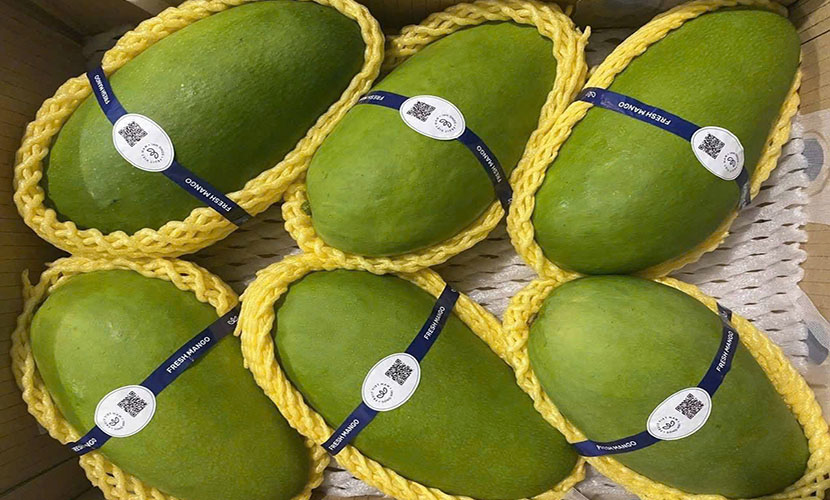
Many localities cultivating Vietnam mangoes are actively establishing plantation codes, improving quality standards. Also, they are developing brand strategies with the goal of sustainably conquering the global market.
To ensure conditions for official mango exports to foreign markets, Tien Giang and Dong Thap provinces have developed more than 10,028 hectares of specialized mango cultivation with 353 export plantation codes granted.

Vietnam mangoes
However, to ensure sustainable development of Vietnam mangoes, localities have implemented various appropriate solutions to enhance the fruit value chain and ensure stable future output.
Mr. Nam, Deputy Director of the Tien Giang Department of Agriculture and Environment, shared that the locality aims to develop fruit cultivation into a strategic sector focused on export and value chain enhancement.
Accordingly, the province prioritizes the development of fruit groups with competitive advantages that have established their brand domestically and internationally. It does so by forming specialized, concentrated, high-value commercial production areas.
To enhance the value chain of competitive specialty fruits, Tien Giang is implementing the “Production-Consumption linkage chain project for Hoa Loc mango” in the province for the period 2020-2025, with orientation toward 2030.
In addition, the provincial agriculture sector actively guides farmers, cooperatives, production groups, and exporting enterprises on traceability and production according to Vietgap and Globalgap standards. These efforts aim to ensure food safety and improve the quality of mango’s export products.
Currently, in specialized cultivation zones, the Hoa Loc Mango Cooperative has been established. It actively connects markets to secure stable outlets for farmers’ exported Hoa Loc mangoes.
The Hoa Loc Mango Cooperative currently has 139 members, managing an area of 80 hectares Tien Giang province. Of this, 19.5 hectares of Vietnam mangoes are certified Vietgap, with plans to expand by another 20 hectares.
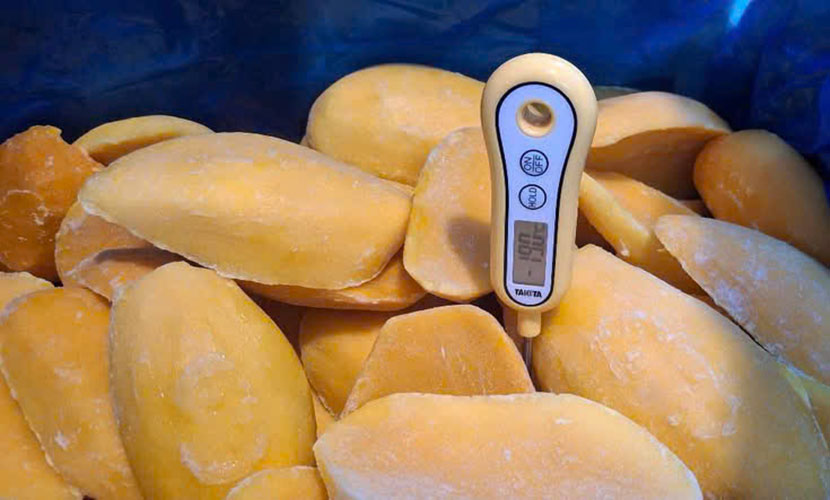
Vietnamese frozen mangoes
Reorganizing production and developing cooperative economies in the homeland of Hoa Loc mangoes contribute to changing farmers’ awareness and cultivation habits. These efforts promote the application of science and technology to intensify cultivation and improve product quality. They also help address labor issues and increase farmers’ income.
The average yield of Hoa Loc mangoes reaches 10 to 15 tons per hectare. Accordingly, the annual profit exceeds 200 million VND per hectare. For orchards treated for off-season fruiting, profits can be 1.5 times higher than normal.
Mr. Khai, a farmer cultivating about 3,000 square meters of Hoa Loc mango, said that for many years he has focused on scientific intensive cultivation. He has installed an automatic irrigation system, carried out pruning and early fruit treatment, and consistently achieved high prices.
Thanks to this, his family earns nearly 200 million VND in net profit annually. Today, mango farmers must renew their agricultural mindset and be quick to absorb and apply science and technology effectively. This will help them create high-quality agricultural commodities that meet export market demands and bring high economic efficiency.
Mr. Tung, Head of Cai Be district, shared that the district will soon advise the province to accurately survey the entire area of Hoa Loc mango plantations. It will also enhance demonstration models and the transfer of scientific and technical knowledge into production, especially focusing on modern production methods.
The district will increase investment to complete the embankment system to prevent flooding, manage climate change response, and combat saltwater intrusion and tidal flooding. It will also continue procedures to request plantation codes for the remaining mango areas to facilitate entry into export markets domestically and internationally.
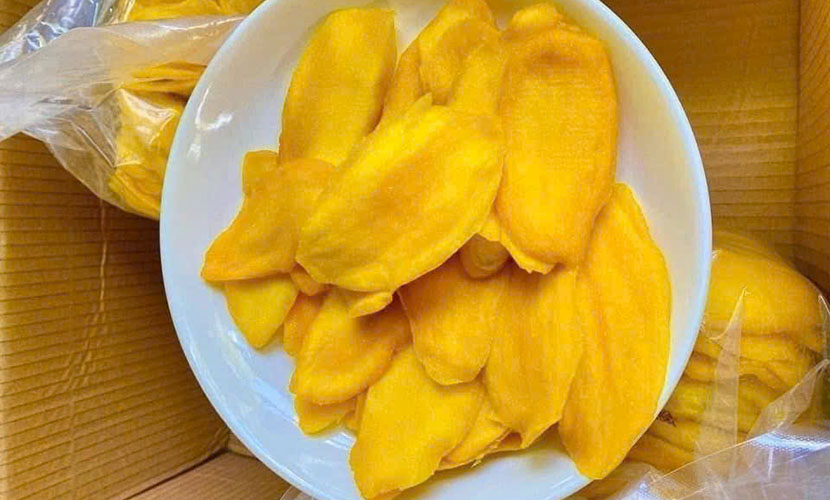
Dried mangoes from Vietnam
To increase mango exports to foreign markets, mango producers must develop the value chain from production, purchasing, processing, packaging, and storage. They must also collaborate closely with Vietnam’s export enterprises to ensure compliance with market regulations.
At the same time, localities, producers, cooperatives, packaging facilities, and processing-export enterprises are informed of difficulties, obstacles, and technical barriers. They are supported to improve compliance capacity, develop mango value chains, increase added value, and meet the standards of strict markets.
Currently, Dong Thap province has been granted 296 mango plantation codes covering more than 8,000 hectares. Of which, 6,220 hectares have plantation codes for export to the Chinese market. Also, 1,110 hectares have codes for export to developed countries.
Particularly, Dong Thap has implemented digital transformation in plantation code registration and traceability on the Vietnam digital agriculture platform. There are 473 hectares of Vietnam mangoes cultivated under Vietgap, Globalgap, and food safety standards.
According to the province, to sell mangoes at high prices, growers need to expand off-season cultivation models. They should also reorganize production through cooperative linkage to avoid price drops caused by simultaneous peak harvests.
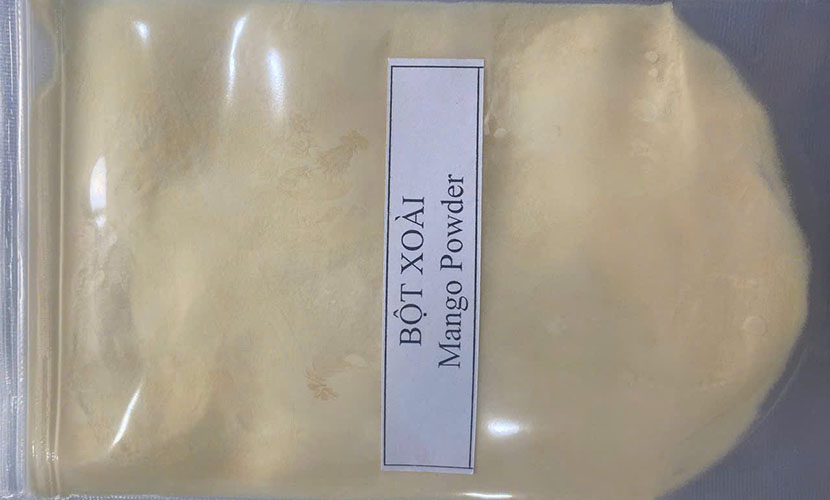
Vietnam’s mango powder
Mango growers in Dong Thap have applied many new technical solutions to reduce costs and increase mango product value. These include producing according to Vietgap, Globalgap, and food safety standards, as well as using organic methods. They also involve applying new scientific techniques for off-season mangoes to improve quality and reduce costs.
Mr. Mach, from Cao Lanh district, has prospered by implementing the “My mango tree” organic cultivation model. Since 2016, he has grown and sold mangoes using this model on 1.2 hectares. His orchard has always been certified as safe products and chosen by customers due to guaranteed quality and traceability.
According to Mr. Mach, although organic cultivation yields are lower than traditional methods, mango trees in his orchard remain healthy and disease-resistant. Especially, organically grown Vietnam mangoes fetch prices 30% higher than regular mangoes.
From the initial mango trees, he has now sold 75 “My mango tree” units at 7 million VND per tree. Applying this model, after deducting costs, Mr. Mach earns over 300 million VND annually.
Aiming for sustainable mango development and high prices, Dong Thap farmers are actively expanding off-season mango cultivation. This currently accounts for about 60% of the area. Off-season mango production meeting safety standards is mainly done in Cao Lanh district and city. Off-season mangoes sell at prices over 10,000 VND/kg higher than main-season mangoes.
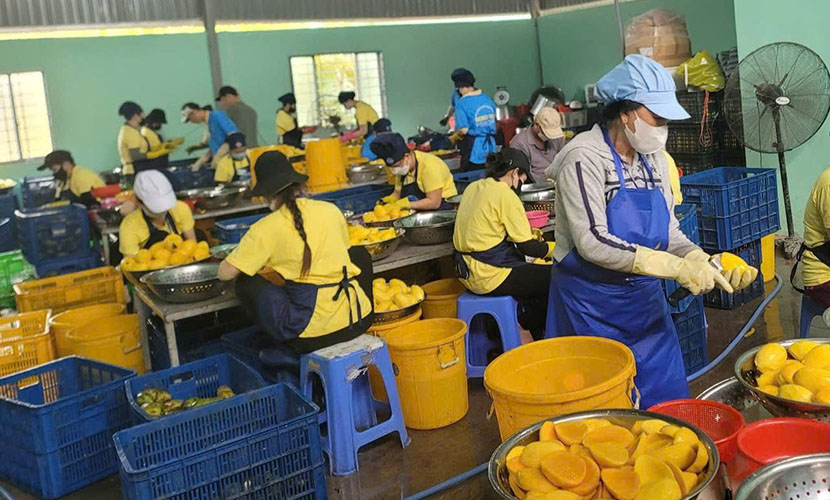
Vietnamese mango factory
An expert said off-season mango cultivation regulates supply during the year to balance supply and demand. It helps farmers earn higher profits. Growers report that off-season mango cultivation commands prices 1.5 to 2 times higher than main-season mangoes.
Off-season mango cultivation has resolved price drops caused by concentrated harvests. This has led to higher income and prices for growers, over 10,000 VND/kg higher. Profits from off-season mangoes reach 200-220 million VND/ha, while main-season mango profits are 150-160 million VND/ha.
Currently, Dong Thap residents exploit mango advantages to produce foods and beverages. They include dried mango, mango cakes, mango rice paper, mango wine, mango candy, and mango ice cream. These efforts create breakthroughs in processing technology and promote the value of local resources for socio-economic development. Many startup products have achieved OCOP certification from 3 to 4 stars.
For Vietnam mangoes continue official exports to demanding markets, farmers should comply with regulations and production techniques to ensure product quality. The agricultural sector should support enterprises, organizations, and farmers in building stable raw material zones and developing sustainable value chains for export.
Vietnamese source: https://baocaovien.vn/tin-tuc/khang-dinh-vi-the-xoai-viet-tren-thi-truong-toan-cau/234972.html
